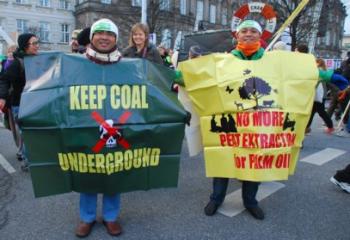- Home
- About
- Campaigns
- Regions
- Themes
- Agrofuels
- Climate justice
- Coastal communities and fisheries
- Disasters
- Economy & debt
- Energy
- Foreign investment
- Forests & forest fires
- Human rights
- Indigenous Peoples
- International Financial Institutions
- Land and food security
- Laws & regulations
- Mining, oil & gas
- Plantations
- Politics & democracy
- REDD
- Regional autonomy
- Transmigration
- Water and dams
- Women
- Publications
- Links
- Contact
Campaign
- Climate Justice and sustainable livelihoods (60)
- Agrofuels and oil palm plantations (44)
- Coal (15)
- MIFEE (4)
- BP - Tangguh (3)
Region
- Indonesia (101)
- Sumatra (26)
- Java, Madura & Bali (7)
- NTT & NTB (4)
- Kalimantan (23)
- Sulawesi (8)
- Maluku (2)
- Papua (26)
- Europe/UK (64)
- International (49)
Publication
- Newsletter articles (85)
- Special reports & briefings (5)
- Books (1)
- Photos and videos (10)
- Fact sheets and updates (14)
- Press releases & position papers (6)
- Letters (9)
Climate justice

Indonesian civil society protest in Copenhagen, December 2009






